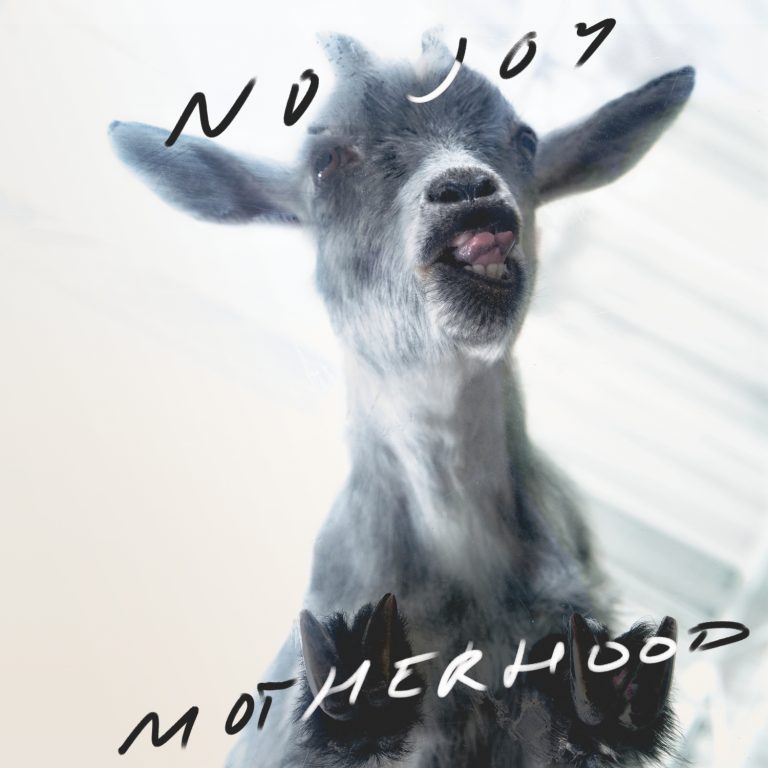No Joy is the project of Montreal-based Jasamine White-Gluz, backed by a rotating cast of bandmates. This variance of collaborators has always helped the project to traverse genres, although they have always been labelled ‘shoegaze’ because of the fuzzed-out guitar that has characterised the majority of their output. This continues on new album Motherhood, but the ‘shoegaze’ label may stick only because of its simplicity – it would be too convoluted to try and find the words to accurately position the wild amounts of genre-blending that happen across this record.
The last No Joy release was the 2018 collaborative EP with Sonic Boom, and Peter Kember’s uncanny knack of making music that sits in the cracks has evidently wiped off on White-Gluz. Opening track “Birthmark” coasts on elasticated washes of guitar fuzz and tropical percussion, before blasting into full-on space rock ascendance for its wordless chorus, and even incorporating some mandolin surfing across the track towards its later stages. Just as you’re settling into the floating euphoria set out by the opener, “Dream Rats” rips through it with a screamo fireball that quickly cools into a galloping acoustic-rimmed fuzz rocker. Another pre-album single, “Four” begins with a wall of crackling guitar that all of a sudden dissolves to leave a portal back to the 90s where a trip-hop beat takes over, placing you in a sumptuous summer setting where birds chirp and babies giggle – only for the song to unexpectedly blast off with a full-thrust ascent through the atmosphere.
Needless to say, this sound metamorphosis from moment to moment continues through the whole of the album’s 42 minutes, and is Motherhood’s unique selling point. For as many as will be impressed by it, there will be plenty for whom it’s just a headache. If you’re willing to stick with it though, you’ll be rewarded with many sonic gems – and some thought-provoking ideas thematically.
Motherhood is a treatise on the maternal role, with White-Gluz looking both to the generation above her and the one below her, as well as at herself. This is far from all love and daisies though, as the words can be just as jarring as the sound-shifting, touching both on the beauty of new life and the organic physical strain it can cause – just look at the opening lines of the album: “Oh I braid your veins / Our old limbs are hard to break.”
No Joy take a deep dive into the more melancholic aspects of motherhood in the album’s central pairing. On “Ageless”, a bubbling, almost-disco track, White-Gluz orbits around the mother’s burden of having to watch her baby grow up and move out into the world: “You used to fit in the palm of my hand,” she opens, and in the chorus sings emphatically but wistfully “my hope for you” – leaving the sentence open-ended for listeners to fill in the blank, or maybe as acknowledgement that it’s unhelpful for parents to lay such a burden on their children. Following track “Why Mothers Die” is a graceful piano-led space ballad where White-Gluz doesn’t explicitly expand on the proposition of the song’s title, but sings in half-sentences, as if the pure exhaustion of life has just become too much.
The next track, “Happy Bleeding”, touches on another rite of passage for young women and mothers. On the one hand, she tries to find the joy in menstruation, underpinning the song with pinwheel electronics and calling it a “golden sunrise”, but on the other she doesn’t shy away from the tough reality, mentioning “thighs on fire”. She then guides the song down into more cerebral sounds while she poetically describes “mountains growing in my mind / they cover the place” – leaving plenty for the listener to decipher.
If this sounds like a heavy and overly burdensome listen, then rest assured that No Joy’s sonic and textural innovation ensures that the mood remains vibrant, bright and hopeful. And, as Motherhood reaches its conclusion with “Kidder”, White-Gluz leaves us with a message of overcoming that is genuinely uplifting, even for those of us without wombs: “make memories of what you still want / take whatever you can in your arms / and at last you grow to be a good mom / Because you had one.” If that doesn’t make you want to immediately pick up the phone and speak to you mother, daughter, or any maternal figure in your life, then you just need to start the kaleidoscopic journey that is Motherhood again from the top.

